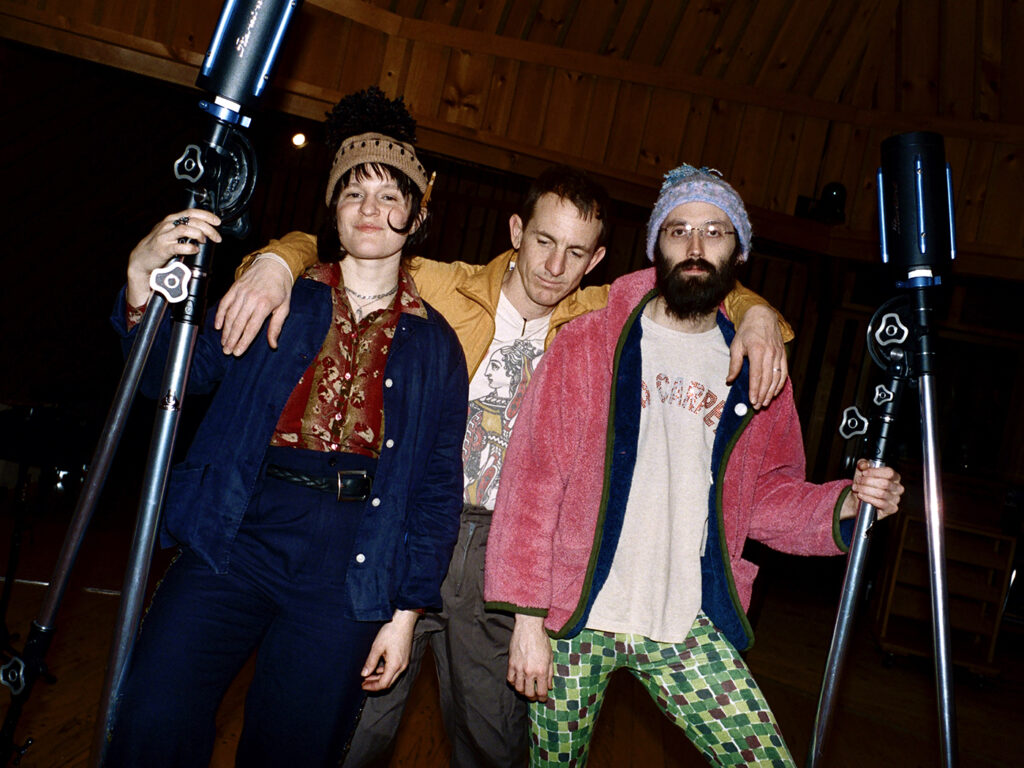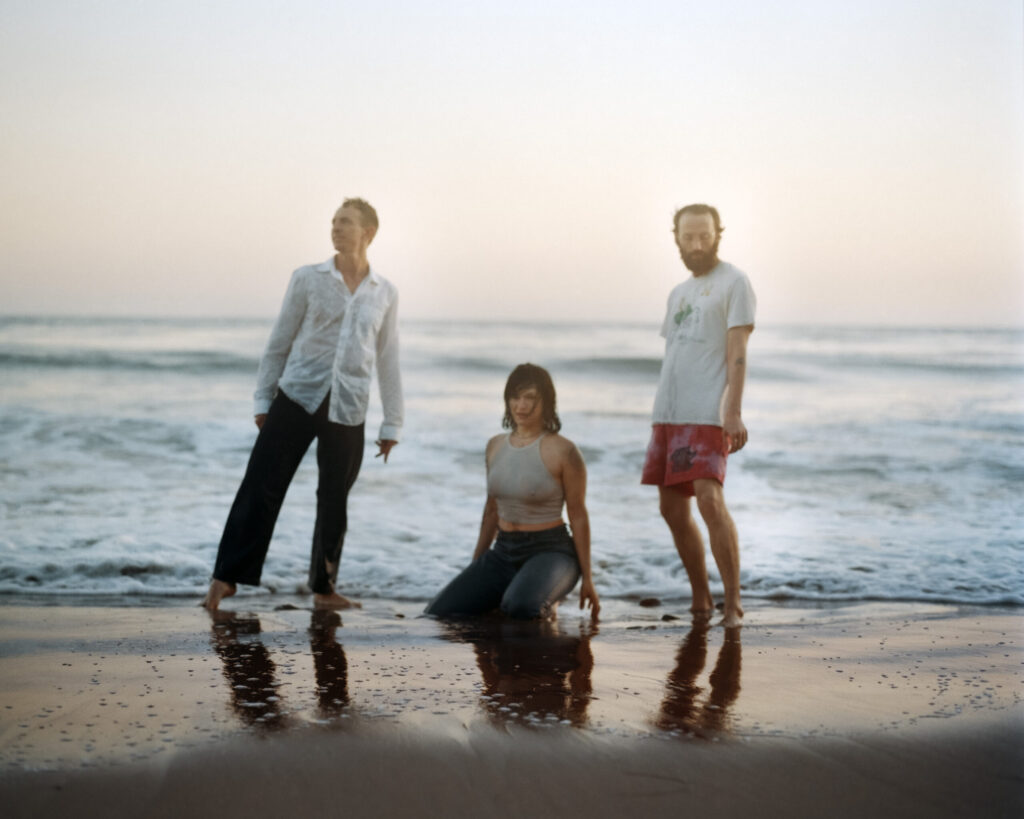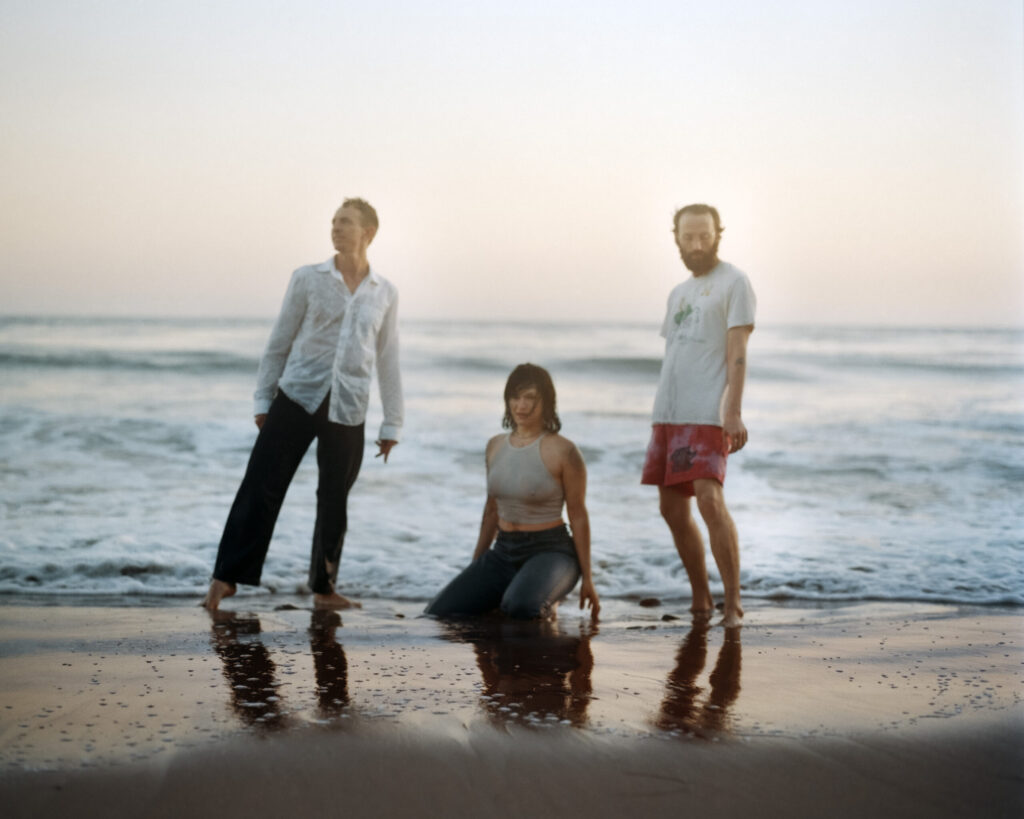Big Thief’s Double Infinity reviewed: uplifting and open-hearted sixth album

If Big Thief are now ostensibly a trio, how come they have never sounded as big as they do on Double Infinity? It’s paradox that reflects one of the central themes of this, their sixth studio album – how people change over time, how the present is simply a bridge between the infinite experience of the past and possibilities of the future. Double Infinity is a dense, deep, fluid album that pushes their exceptional rate of development into new areas thanks in part to a roster of New York musicians, who collectively add layers to the band’s songs, shifting them into unexpected directions, but without overwhelming the essence of Big Thief’s trade: making music from raw emotion. “Gonna turn it all, into rock and roll,” sings Adrianne Lenker on “Grandmother”, a lyric that seems more like a mantra, set against a backdrop of percussion and wordless vocalising.
A dense, deep, fluid album…
If Big Thief are now ostensibly a trio, how come they have never sounded as big as they do on Double Infinity? It’s paradox that reflects one of the central themes of this, their sixth studio album – how people change over time, how the present is simply a bridge between the infinite experience of the past and possibilities of the future. Double Infinity is a dense, deep, fluid album that pushes their exceptional rate of development into new areas thanks in part to a roster of New York musicians, who collectively add layers to the band’s songs, shifting them into unexpected directions, but without overwhelming the essence of Big Thief’s trade: making music from raw emotion. “Gonna turn it all, into rock and roll,” sings Adrianne Lenker on “Grandmother”, a lyric that seems more like a mantra, set against a backdrop of percussion and wordless vocalising.
These rapturous incantations comes courtesy of Laraaji – the most prominent musician who joined Lenker, guitarist Buck Meek and drummer James Krivchenia for recordings sessions at New York’s Record Plant. In a neat echo of Laraaji’s ‘discovery’ by Brian Eno – who heard him playing in Washington Square and dropped his phone number into the collection basket – Laraaji gave Lenker his business card when they shared a bill at the Welcome Home Festival in October 2023. On “Grandmother”, Laraaji plays his trademark zither adding percussion and manipulating sounds with an iPad and effects pedals. Later, “Los Angeles” opens with peals of laughter from the gathered musicians, a tribute to Laraaji’s long-running wellbeing-enhancing “laughter workshops”.
Plenty had been accomplished in the Big Thief Extended Universe…
But on “Grandmother”, Laraaji’s wailing vocal that holds a central role in the melody. This song is a musical touchstone for the record, expanding the Big Thief template into electronica, drone and world music. It was also significant for being the first song that Lenker, Meek and Krivchenia wrote as a trio during extended writing sessions, as the band tried to find a new way forward following the sprawling drama of 2022’s double LP Dragon New Warm Mountain I Believe In You and the departure of bassist Max Oleartchik.
In the meantime, plenty had been accomplished in the Big Thief Extended Universe – all three members have released solo albums, while the band backed songwriter Tucker Zimmerman on 2024’s Dance Of Love. On Double Infinity, Oleartchik has been replaced by Joshua Crumbly and the group have taken this change in their stride – much as you’d expect from a band that survived the marriage and divorce of Lenker and Meek without missing a beat.
Where Dragon New Warm Mountain spread its ambition over 20 kaleidoscopic songs, largely performed by the band alone, Double Infinity crams a similar wealth of aspiration into nine tracks. Much of the weight comes from the sheer number of people in the studio. Lenker is backed by three vocalists, all talented songwriters in their own right – Hannah Cohen, Alena Spanger and June McDoom. Percussion comes from various combinations of Mikel Patrick Avery, Caleb Michel and Jon Nellen, while Mikey Buishas plays piano and tape loops. Add Laraaji and Crumbly, there’s a lot of people in the room.
The gap between the subconscious and self-consciousness…
That puts the onus on Lenker to write songs big enough to contain them all. On “Words” she seems to question her own capacity to do so. “Words don’t make sense,” she sings with a gasp, “words won’t make it right”, while the band develop a meaty drone, out of which spirals a great guitar line. It’s one of several songs on the record about communication, and the gap between what we say and what we think – or in Lenker’s neat explanation, subconscious and self-consciousness.
That duality sits at the heart of the record. It’s explored by the title song, “Double Infinity”, which is about standing “at the bridge of two infinities; what’s been lost and what lies waiting”.
Lenker sings in a higher register and the musicians step back to give her thoughts space as the beautiful vocal melody continues to breath and unfold. The song spirals back on itself as Lenker offers a series of contradictions – unrelenting and cascading, mourning and celebrating, forming and fading – before reaching some sort of resolution.
She returns to the idea on “How Could I Have Known”, one of the more conventional tracks on the album. Here, she looks back at the start of a relationship asking, “How could I have known/In that moment?”
As the song continues, it transpires that Lenker is in Paris, walking along the Seine. She’s looking at the padlocks that lovers attach to the Pont des Arts and pondering how things can finish yet continue at the same time. A relationship might end but love prevails.
A pair of songs tease with structure
A pair of songs tease with structure. On “No Fear”, the beat is jagged and intense, with Crumbly’s crawling bass poking out the percussion to provide something to cling to. Loops and drone build a sound not unlike The Cure, while Lenker’s lyric emerges from the foggy soundscape as she chants the same 10 lines over and over like a mantra. “Happy With You” opens with an acoustic jangle and proceeds with poppy vigour as Lenker sings three lines that would form a haiku, if she didn’t repeat each individual sentence over and over, building a wall of words from 17 syllables like a protective spell against the world.
While early Big Thief songs were often written from a third-person perspective and populated by characters with women’s names, Lenker has written more consistently from the first-person perspective since her 2020 solo record, Songs. That brings the listener straight into the story, blurring the line between autobiography and storytelling. That confusion is increased by the detail that Lenker brings to three of the best songs on the record. On “All Night All Day” the musicians deliver a buoyant musical palate while Lenker drawls an intimate opening line, as she sings about pleasure and love. Once more she is pondering two extremes, is love poison or is it sugar? Lenker believes it is neither: “Love is just a name/A thing we say for what pulls through/’Til we come together”.
Uplifting and open-hearted…
Opening track “Incomprehensible” has some of Big Thief’s traditional bounce as the music races to keep pace with Lenker’s lyrics. Here we first meet the central concept, with Lenker remembering moments from the past, and imagining her future, looking at getting older with liberating abandon rather than fear. It includes her best verse on the record. On “Real House”, from her 2024 solo album Bright Future, Lenker sang “Now 31, and I don’t feel strong”. What a difference two years makes. Now she sings that “in two years it’s my birthday and I’ll be 33/That doesn’t really matter next to eternity/But I like a double number and I like an odd one too/And everything I see from now on will be something new.”
That’s typical of Lenker’s worldview, which has little room for regret and recrimination. It’s what makes her love songs so intense and her break-up songs so generous and free from self-pity to the extent that at times it can be hard to tell them apart. “Los Angeles” is a typical example, rich with detail – addresses, time, seat numbers – but vaguer in who Lenker is singing about. A flood of captivating images are buoyed along by the rich musical tapestry and a song that’s illustrative of the broader mood: uplifting and open-hearted, looking backwards and forwards without blame or trepidation.
When you purchase through links on our site, we may earn an affiliate commission. Here’s how it works.
Link to the source article – https://www.uncut.co.uk/reviews/big-thiefs-double-infinity-reviewed-their-uplifting-and-open-hearted-sixth-album-151204/
-
Mackie Onyx Producer 2-2 USB Audio Interface and Traction DAW Recording Software$79,99 Buy product
-
Military Army Brass and Copper Blowing Bugle Attack War Command Signal Horn 6″ Inch$14,00 Buy product
-
Adam Audio Sub7 7-Inch Powered Studio Subwoofer Bundle with Microphone Cable (2-Pack) and 16AWG Cable (2-Pack) (5 Items)$699,99 Buy product
-
MORSE Soprano Ukulele Arm Rest Ukulele for Beginner Pack-21 Inch with Gig Bag Fast Learn Songbook Tuner Pick All in One Kit$36,99 Buy product
-
Roland RD-88 Professional Stage Piano, 88-keyBuy product
-
BOSS MIDI Cable (BMIDI-2-35)$19,99 Buy product












Responses